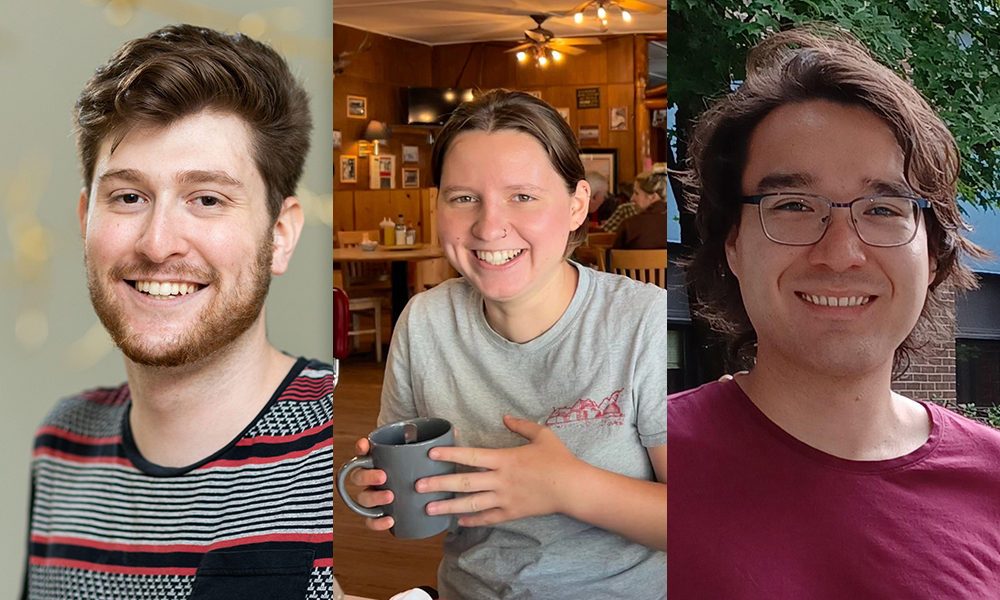Wesleyan Students, Alumni Earn National Science Foundation Fellowships

This spring several current and former Wesleyan students were awarded a National Science Foundation Award. This fellowship award is among the most prestigious available in the category.
The National Science Foundation (NSF) provides about 25 percent of the federal financial support for research at colleges and universities in the United States. On average, it provides about 12,000 awards for research, education, and training at over 2,000 different institutions across the country each year. For each of the fellowships, the NSF provides an annual $37,000 stipend and $12,000 in cost of education allowance, disbursed through the institution the fellowship provides three years of financial support over a five-year fellowship period.
“It was such a delightful surprise to get message after message that four of my current and former students had been selected for this year’s Graduate Research Fellowship Program,” Associate Professor of Astronomy and Integrative Sciences Meredith Hughes said. “They are each outstanding scientists who are forging new paths in different ways, and what they all have in common is a strong curiosity about how the world works, as well as a strong work ethic and incredible persistence and determination.”
Anna Fehr ’23, one of Hughes’ former students, will continue to study planet-forming disks from the formation of some main sequence stars after researching them at Wesleyan. It is still to be determined at what stage of she would study the disks, she said. She may study younger disks that actively have planets forming within them, called protoplanetary disks. She is open to more computational and theoretical projects as well, she said.
“[Debris disks] represent a remnant of the planet formation process and the reason why we’re interested in studying them is mostly to answer questions about planet formation—particularly when and how the core forms and how they create their atmospheres,” Fehr said. Fehr will be pursuing her Ph.D. at Harvard University.
Bryton Smith, MA ’24 is using his NSF fellowship to study fossils from one of the oldest living tree genera in the world, the Ginkgo tree. He is using cell size as a proxy for genome size since the DNA does not preserve well in the fossil record.
“Broadly speaking, I’m interested in integrating modern DNA data with fossil data and calibrating molecular dating methods that use modern DNA,” Smith said.
In his current and future work, he is interested in improving botanical inferences based on the premise that certain DNA sequences are molecular clocks that mutate at constant rates. Fossil-calibrated molecular clocks, he explained, give botanists and other biologists the ability to investigate genome evolution and diversification in the geologic past that would have been unimaginable to nineteenth century paleontologists.
Alumnus Kian Caplan ’21, who graduated from Wesleyan with a degree in Neuroscience & Behavior, is studying the neural circuits which may become disrupted in neuropsychiatric disorders characterized by repetitive behaviors, like Tourette syndrome, OCD, and Trichotillomania. His goal is to “potentially identify highly specific therapeutic targets for these disorders, as current treatment options have variable efficacy or nasty side effects,” he said.
“As someone living with Tourette and OCD, I firmly believe that we need more researchers with neuropsychiatric disorders to study what makes their brains different,” Caplan said. “Our personal experiences bring not only an unequivocal passion for the work, but also invaluable insights to shape the knowledge about us.”
Current Students and Recent Graduates:
Anna Fehr ’23, Astronomy
Hannah Lewis ’23, Astronomy
Bryton Smith, MA ’24, Earth & Environmental Science
Alumni:
Celeste Barnaby ’18, Computer Science and Mathematics
Hilary Brumberg ’17, Earth & Environmental Science and Hispanic Literatures and Cultures
Kian Caplan ’21, Neuroscience & Behavior and Science in Society
Andrew McCracken ’19, Biology and Neuroscience & Behavior
Ava Nederlander ’22, Computer Science and College of Integrative Sciences
David Vizgan ’21, Astronomy and Physics

